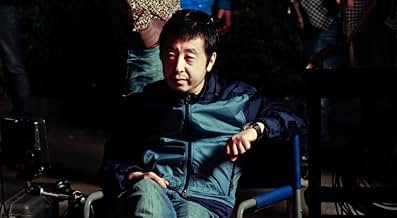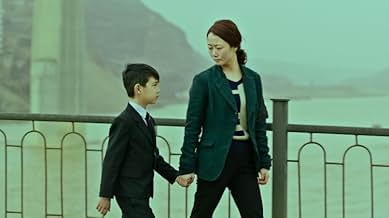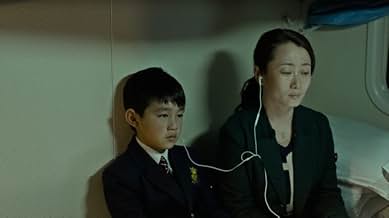NOTE IMDb
6,9/10
6,8 k
MA NOTE
La vie de Tao et de ses proches est explorée à travers trois périodes différentes : 1999, 2014 et 2025.La vie de Tao et de ses proches est explorée à travers trois périodes différentes : 1999, 2014 et 2025.La vie de Tao et de ses proches est explorée à travers trois périodes différentes : 1999, 2014 et 2025.
- Réalisation
- Scénario
- Casting principal
- Récompenses
- 26 victoires et 42 nominations au total
Yi Zhang
- Zhang Jinsheng
- (as Zhang Yi)
Zijian Dong
- Zhang Daole aka Dollar
- (as Dong Zijian)
Avis à la une
Mountains May Depart starts on perhaps my favourite opening shot of the year. Kicking it off with the Pet Shop Boys' vibrant song "Go West," we're straight in the middle of a dance routine with a room full of people clumsily bopping in sync. It's infectious and filled with unbridled hope and joy. Unfortunately, it's downhill from here, though the film is never aiming for the same type of exuberance. I'm not familiar with Jia Zhangke or his following – Walter Salles apparently has a hotly anticipated documentary about the director at this festival – but Mountains May Depart seems like an endearing and accessible introduction. Telling three stories in three separate time periods, I do enjoy the way it explores causality in how these small relationships and dramas at one time can feed into a dilemma 25 years later.
The first story, set during the turn of the century in 1999 when Chinese capitalism was healthy, follows a love triangle between Tao, an aerobics instructor, Zhang, an egotistic entrepreneur, and Liangzi, a man who works for Zhang. The three hang out as friends but Zhang can't bear the idea of Tao getting close to Liangzi and despite emotional logic, it's social economical pressures that make decisions. Cut to 2014, Tao and her beau have divorced and she's now estranged from her son. Upon the death of her father, her son is forced to visit and she must make the decision of how connected she should be to him throughout his life. Then off to an imagined Australia in 2025, her son doesn't remember her and currently struggles with his relationship with his father where they now have a language barrier. With the help of a teacher he grows attached to, he goes in search for Tao.
Each section of the film is approached in a different way, reminiscent of the way last year's The Grand Budapest Hotel and Mommy played with ratios. The first section is a tight 4:3, the second is a full frame, and the third is widescreen. However, these feel like they represent the period and the environment moreso than the character's emotions, with exception to the mid- section, which ideally captures Tao's regret and longing. It's a mixed bag depending on the talent, with some tender moments landing strong and some clumsily misguided, the latter most prominent in the last section. That first section has a bait and switch for the decades long heartache that the seemingly innocent love triangle causes. The theme of how people drift apart no matter how close they are resonates but it's unbearably melancholic without Zhangke offering much of a satisfying a silver lining.
It's a shame that despite the film's strengths it has too many loose ends and unnecessary moments that don't appear to add to the character arcs or the themes. With a 25 year story like this where no single character carries us through the whole film, every moment has to count to something. There's little justification as to why the third section is in glorious widescreen and set in Australia, but perhaps this just speaks to how disconnected it is from the rest of the film. While mostly drenched in Chinese culture, I wish Zhangke didn't resort to certain American clichés such as sad montages of characters having deep thoughts set to music. However, with those time gaps, Zhangke does harness a powerful nostalgic through just a few song motifs carried through all three sections that are well executed. Both disarmingly simple and complex, his ambition is admirable, but it doesn't quite reach the potential that this expanse allows it to travel.
7/10
Read more @ The Awards Circuit (http://www.awardscircuit.com/)
The first story, set during the turn of the century in 1999 when Chinese capitalism was healthy, follows a love triangle between Tao, an aerobics instructor, Zhang, an egotistic entrepreneur, and Liangzi, a man who works for Zhang. The three hang out as friends but Zhang can't bear the idea of Tao getting close to Liangzi and despite emotional logic, it's social economical pressures that make decisions. Cut to 2014, Tao and her beau have divorced and she's now estranged from her son. Upon the death of her father, her son is forced to visit and she must make the decision of how connected she should be to him throughout his life. Then off to an imagined Australia in 2025, her son doesn't remember her and currently struggles with his relationship with his father where they now have a language barrier. With the help of a teacher he grows attached to, he goes in search for Tao.
Each section of the film is approached in a different way, reminiscent of the way last year's The Grand Budapest Hotel and Mommy played with ratios. The first section is a tight 4:3, the second is a full frame, and the third is widescreen. However, these feel like they represent the period and the environment moreso than the character's emotions, with exception to the mid- section, which ideally captures Tao's regret and longing. It's a mixed bag depending on the talent, with some tender moments landing strong and some clumsily misguided, the latter most prominent in the last section. That first section has a bait and switch for the decades long heartache that the seemingly innocent love triangle causes. The theme of how people drift apart no matter how close they are resonates but it's unbearably melancholic without Zhangke offering much of a satisfying a silver lining.
It's a shame that despite the film's strengths it has too many loose ends and unnecessary moments that don't appear to add to the character arcs or the themes. With a 25 year story like this where no single character carries us through the whole film, every moment has to count to something. There's little justification as to why the third section is in glorious widescreen and set in Australia, but perhaps this just speaks to how disconnected it is from the rest of the film. While mostly drenched in Chinese culture, I wish Zhangke didn't resort to certain American clichés such as sad montages of characters having deep thoughts set to music. However, with those time gaps, Zhangke does harness a powerful nostalgic through just a few song motifs carried through all three sections that are well executed. Both disarmingly simple and complex, his ambition is admirable, but it doesn't quite reach the potential that this expanse allows it to travel.
7/10
Read more @ The Awards Circuit (http://www.awardscircuit.com/)
Mountains May Depart, directed by Zhangke Jia, is a very fine Chinese drama, whose timeline spans some twenty-five years from the past, to the present, to the future, representing China in the modern age and possibly where it's headed. It is something that's quite unique and interesting. Jia was also the director of a movie I saw a few years ago called A Touch of Sin, and while I remember admiring that film (which is of a considerably darker subject matter than this one), it left me feeling a little cold, while I enjoyed the experience of Mountains May Depart more.
The main character in story, who is connected in one way or another to almost every other prominent person, is a woman named Tao Zhao, played by Shen Tao. She is the heart of the film even during much of the parts she's not in, playing it with empathy and truth in her journey, a very fine performance. There are two other good performances by Yi Zhang and Jing Dong Liang, and these three main character evolve significantly through time. But the main strength is a story dealing themes of class and materialism, and the cost of progress, put together in a way worthy of these universal human subjects.
Mountains does have some issues in the final of the three acts as it becomes a little odd--odd in a way that that might have worked with different material, but doesn't quite fit with the rest of this film. Still, this is an overall fascinating and moving experience, well-acted and written, making itself very relatable and is an impressive way to view these people over time.
The main character in story, who is connected in one way or another to almost every other prominent person, is a woman named Tao Zhao, played by Shen Tao. She is the heart of the film even during much of the parts she's not in, playing it with empathy and truth in her journey, a very fine performance. There are two other good performances by Yi Zhang and Jing Dong Liang, and these three main character evolve significantly through time. But the main strength is a story dealing themes of class and materialism, and the cost of progress, put together in a way worthy of these universal human subjects.
Mountains does have some issues in the final of the three acts as it becomes a little odd--odd in a way that that might have worked with different material, but doesn't quite fit with the rest of this film. Still, this is an overall fascinating and moving experience, well-acted and written, making itself very relatable and is an impressive way to view these people over time.
Read full review here: http://bit.ly/2eo9O3d
Somewhere in Mountains May Depart there's a quote I can't recall that says, effectively, you can't spend your entire life with any one other person. While this may not be categorically true, if you think through the eras of a life - as a baby, toddler, childhood, teenager, young adult, middle-age, and so on - it is unlikely that any one person will be a part of your daily interactions throughout. Considering that, it can be true that the impact someone has on your life may be greater than the portion of time you spend with them. Through a handful of characters whose lives intertwine over three distinct periods of time - 1999, 2014, & 2025 - Chinese-born director Jia Zhangke explores and rejoices in the emotional resonance of our relationships in Mountains May Depart.
The three epochs of the film are each brilliantly conceived aesthetically to provide a subtle atmospheric guide to the scenes they are home to within the story. The boxy, more realistic and grainy style of the 1999 sequence - designed to match actual documentary footage the director and his cinematographer shot from the same period - is a little more raw, like the youthful emotions the characters experience in their mid-20's. Here we have a love triangle where our central character, Tao, is confronted with a choice between the brash, rich, and charming Jinsheng and the humble coal-miner Liangzi. The 2014 section is a wider aspect ratio with a higher quality, yet natural visual reflecting Tao's middle-aged experience. Life's lessons have provided a bit more perspective and the muted colors are like some of her dreams that haven't worked out as planned. She's divorced and facing a continental estrangement from her 7-year old son. A fully widescreen format with an artificial, over-developed HD quality evokes a 2025 that is equally more advanced and more separated from the past. This is the backdrop as Tao's son Dollar has to learn why he feels unsettled in a life he's done little to create for himself. Here, in a bit of an Oedipal twist, he develops a relationship with a surrogate mother of sorts that reminds the youth, now so far removed from his past that he can't even speak his first language, where he came from. For the first time of his own volition he makes the choice to search and reach backwards so that he can progress and grow. It hurts. You don't know if he achieves what he's reaching for but the important thing is that he chooses to do it.
Zhangke uses artifacts from his own life, from pop-culture, and of a more universal nature to serve as totems for emotional relationships that bridge the difference timelines. In 1999 Tao is young and bright, greeting each moment with a smile. She rejoices in music and food that bring her joy. Later in 2014 she faces losing everyone that is or has been important to her and these things become tools for holding on to what she's lost. A divorce left her with lots of money and a lost custody battle for her young son, whose father is abandoning all remnants of their culture and taking him to Australia. After panicking, Tao resolves to make the most impact she can on the impressionable and hungry heart of her little boy. She prepares several tokens for him to keep close through taste, touch, sound and feeling, as they will become further away than ever. The keys she gives Dollar are based on the director's own mother doing the same for him. It's possible she may never know the impact they have in his life but they become figuratively the keys to his unlocking his own freedom (see what I did there??) as he comes of age in 2025. These tokens used throughout the film, and especially two key pieces of music and the light-touch score from Yoshihiro Hanno, immediately have the same effect on the viewer each time they are re-introduced to signify a key relationship and emotion whose origin may be otherwise untraceable to the characters.
Somewhere in Mountains May Depart there's a quote I can't recall that says, effectively, you can't spend your entire life with any one other person. While this may not be categorically true, if you think through the eras of a life - as a baby, toddler, childhood, teenager, young adult, middle-age, and so on - it is unlikely that any one person will be a part of your daily interactions throughout. Considering that, it can be true that the impact someone has on your life may be greater than the portion of time you spend with them. Through a handful of characters whose lives intertwine over three distinct periods of time - 1999, 2014, & 2025 - Chinese-born director Jia Zhangke explores and rejoices in the emotional resonance of our relationships in Mountains May Depart.
The three epochs of the film are each brilliantly conceived aesthetically to provide a subtle atmospheric guide to the scenes they are home to within the story. The boxy, more realistic and grainy style of the 1999 sequence - designed to match actual documentary footage the director and his cinematographer shot from the same period - is a little more raw, like the youthful emotions the characters experience in their mid-20's. Here we have a love triangle where our central character, Tao, is confronted with a choice between the brash, rich, and charming Jinsheng and the humble coal-miner Liangzi. The 2014 section is a wider aspect ratio with a higher quality, yet natural visual reflecting Tao's middle-aged experience. Life's lessons have provided a bit more perspective and the muted colors are like some of her dreams that haven't worked out as planned. She's divorced and facing a continental estrangement from her 7-year old son. A fully widescreen format with an artificial, over-developed HD quality evokes a 2025 that is equally more advanced and more separated from the past. This is the backdrop as Tao's son Dollar has to learn why he feels unsettled in a life he's done little to create for himself. Here, in a bit of an Oedipal twist, he develops a relationship with a surrogate mother of sorts that reminds the youth, now so far removed from his past that he can't even speak his first language, where he came from. For the first time of his own volition he makes the choice to search and reach backwards so that he can progress and grow. It hurts. You don't know if he achieves what he's reaching for but the important thing is that he chooses to do it.
Zhangke uses artifacts from his own life, from pop-culture, and of a more universal nature to serve as totems for emotional relationships that bridge the difference timelines. In 1999 Tao is young and bright, greeting each moment with a smile. She rejoices in music and food that bring her joy. Later in 2014 she faces losing everyone that is or has been important to her and these things become tools for holding on to what she's lost. A divorce left her with lots of money and a lost custody battle for her young son, whose father is abandoning all remnants of their culture and taking him to Australia. After panicking, Tao resolves to make the most impact she can on the impressionable and hungry heart of her little boy. She prepares several tokens for him to keep close through taste, touch, sound and feeling, as they will become further away than ever. The keys she gives Dollar are based on the director's own mother doing the same for him. It's possible she may never know the impact they have in his life but they become figuratively the keys to his unlocking his own freedom (see what I did there??) as he comes of age in 2025. These tokens used throughout the film, and especially two key pieces of music and the light-touch score from Yoshihiro Hanno, immediately have the same effect on the viewer each time they are re-introduced to signify a key relationship and emotion whose origin may be otherwise untraceable to the characters.
"Mountains May Depart" (aka "Shan he gu ren") is an odd experience of a movie. Why? Well, because it is on one hand a very nicely told story with three different story lines, but on the other hand the movie is excruciatingly slow paced to the point of where it tests the will to continue in the audience.
There is no doubt that director Zhangke Jia managed to pull off a very good job here in terms of bringing the story to life on the screen. And it is a very unique and beautiful story told, one that sinks in deep and sticks with you. Just a shame that it was done in such a slow and monotone pace.
The story is divided into three different segments, all of which are interwoven with one another in one or more aspects. And that is what makes the story so interesting. That, and because the story lines and subplots were interesting, and the characters portrayed in the movie were vibrant, colorful and realistic - giving the audience someone to relate to and identify with. Of course, all three stories were not equally great, and the audience will like one story better than the other. Personally, I enjoyed the first story centered on Shen Tao the most.
As for the cast, well I can say that they had indeed done a great job in the casting process and gotten some really good talents to star in the movie. I was especially impressed with Tao Zhao's performance, and Sylvia Chang also really brought something good to the movie with her performance.
While "Mountains May Depart" is without a doubt a beautiful movie, then it just lacked that particular ingredient to make the movie unique. But it is definitely well worth a viewing if you enjoy a good drama with a well-written storyline. However, keep in mind that the pacing of the movie is slow, very, very slow.
There is no doubt that director Zhangke Jia managed to pull off a very good job here in terms of bringing the story to life on the screen. And it is a very unique and beautiful story told, one that sinks in deep and sticks with you. Just a shame that it was done in such a slow and monotone pace.
The story is divided into three different segments, all of which are interwoven with one another in one or more aspects. And that is what makes the story so interesting. That, and because the story lines and subplots were interesting, and the characters portrayed in the movie were vibrant, colorful and realistic - giving the audience someone to relate to and identify with. Of course, all three stories were not equally great, and the audience will like one story better than the other. Personally, I enjoyed the first story centered on Shen Tao the most.
As for the cast, well I can say that they had indeed done a great job in the casting process and gotten some really good talents to star in the movie. I was especially impressed with Tao Zhao's performance, and Sylvia Chang also really brought something good to the movie with her performance.
While "Mountains May Depart" is without a doubt a beautiful movie, then it just lacked that particular ingredient to make the movie unique. But it is definitely well worth a viewing if you enjoy a good drama with a well-written storyline. However, keep in mind that the pacing of the movie is slow, very, very slow.
Jia Zhangke is a prominent figure in contemporary world cinema as one of the leading directors of the so-called sixth generation of Chinese filmmakers. He has become known for his personal films which discuss social transition in modern China through the experience of the individual. Zhangke's latest film "Mountains May Depart" (2015) continues this in an essential, if not exactly surprising, fashion. Like "A Touch of Sin" (2013) and "Still Life" (2006), the film has an episodic structure, but narrative is much more conventional and straight-forward. While there is a lot of change in narrative focalization, "Mountains May Depart" is strongly structured around the protagonist Tao, played by the director's muse Tao Zhao, whose life unfolds before us in three distinct periods: 1999, 2014, and 2025. Thus Zhangke takes a look behind, reflects on the present, and anticipates the future of the Chinese society.
As a social film, "Mountains May Depart" studies the individual in the grip of a changing world. It tackles the difficulty of communication to the extent where parents need interpreters to talk to their children. Globalization, capitalism, and the new freedom of the 21st century do not offer comfort or help, but rather appear as rootlessness, alienation, and solitude in the lives of people.
All of Zhangke's films are, more or less, about change, but in "Mountains May Depart" this theme manifests itself clearly on the level of style and narrative. Zhangke's narrative includes a modernist combination of perspectives, creating a simple complexity which is never disorienting, as different characters are followed throughout the film, enhancing a pluralist sense of multitude and change. While Zhangke's style has been known as consisting of long takes and complex camera movement, "Mountains May Depart" presents a greater variety in style. Zhangke's camera keeps a short distance to the characters, mainly on the level of the medium shot, but there are also memorable establishing extreme long shots which highlight the minuteness of the individual in a vast landscape. The camera does move a lot, though perhaps subtly, but the editing rhythm is not strikingly slow. One of the most conspicuous stylistic elements of the film is the changing aspect ratio. The first episode is shot in the letterbox 4:3 ratio, the second in the contemporary standard 16:9, and the last in the widescreen format 2.35:1. This constant widening of the aspect ratio of the image reflects not only the globalization of the Chinese society and the characters moving outside of their homeland but also a more primordial experience of change that is constant in human existence. It embraces the Heraclitean flux.
Thus Zhangke poeticizes the experience of change in a cinematic fashion; that is to say, he utilizes cinematic means to articulate a profound, existential experience of change. This he does by combining features that change (the aspect ratio, the focalizing perspective) with perpetual elements such as recurring songs ("Go West" by Pet Shop Boys), dramatic motifs (the dog, the keys), and the intimate cinematography. Like the characters, Zhangke's style and narrative seem to be searching for a red line, something that gives meaning and coherence in a world of change.
While "Mountains May Depart" might feel like a minor work in Zhange's oeuvre, it does redeem itself for a patient spectator. Like Zhangke's other films, it too looks at the contemporary Chinese society, the inevitable transition from the perspective of the individual, and modern identity in an ever-changing world. Although there certainly is sadness to all this, Zhangke's film is also quite optimistic and bright in comparison to his previous, darker film "A Touch of Sin". Mountains may depart -- the very borders of the image may broaden -- but something will endure. It is, in fact, as if higher levels of discourse were trying to find unity amidst variety: something that remains in the perpetual flux of change.
As a social film, "Mountains May Depart" studies the individual in the grip of a changing world. It tackles the difficulty of communication to the extent where parents need interpreters to talk to their children. Globalization, capitalism, and the new freedom of the 21st century do not offer comfort or help, but rather appear as rootlessness, alienation, and solitude in the lives of people.
All of Zhangke's films are, more or less, about change, but in "Mountains May Depart" this theme manifests itself clearly on the level of style and narrative. Zhangke's narrative includes a modernist combination of perspectives, creating a simple complexity which is never disorienting, as different characters are followed throughout the film, enhancing a pluralist sense of multitude and change. While Zhangke's style has been known as consisting of long takes and complex camera movement, "Mountains May Depart" presents a greater variety in style. Zhangke's camera keeps a short distance to the characters, mainly on the level of the medium shot, but there are also memorable establishing extreme long shots which highlight the minuteness of the individual in a vast landscape. The camera does move a lot, though perhaps subtly, but the editing rhythm is not strikingly slow. One of the most conspicuous stylistic elements of the film is the changing aspect ratio. The first episode is shot in the letterbox 4:3 ratio, the second in the contemporary standard 16:9, and the last in the widescreen format 2.35:1. This constant widening of the aspect ratio of the image reflects not only the globalization of the Chinese society and the characters moving outside of their homeland but also a more primordial experience of change that is constant in human existence. It embraces the Heraclitean flux.
Thus Zhangke poeticizes the experience of change in a cinematic fashion; that is to say, he utilizes cinematic means to articulate a profound, existential experience of change. This he does by combining features that change (the aspect ratio, the focalizing perspective) with perpetual elements such as recurring songs ("Go West" by Pet Shop Boys), dramatic motifs (the dog, the keys), and the intimate cinematography. Like the characters, Zhangke's style and narrative seem to be searching for a red line, something that gives meaning and coherence in a world of change.
While "Mountains May Depart" might feel like a minor work in Zhange's oeuvre, it does redeem itself for a patient spectator. Like Zhangke's other films, it too looks at the contemporary Chinese society, the inevitable transition from the perspective of the individual, and modern identity in an ever-changing world. Although there certainly is sadness to all this, Zhangke's film is also quite optimistic and bright in comparison to his previous, darker film "A Touch of Sin". Mountains may depart -- the very borders of the image may broaden -- but something will endure. It is, in fact, as if higher levels of discourse were trying to find unity amidst variety: something that remains in the perpetual flux of change.
Le saviez-vous
- AnecdotesSome sequences (in the 1999 segment) were filmed by the director and the cinematographer back in 2001.
- GaffesThe young boy who plays Tao's son in 2014 is also part of the crowd of children that watches her perform at the new year's celebrations in 1999.
- Crédits fousThe title appears more than forty minutes after the beginning of the movie.
- Bandes originalesGo West
Written by Henri Belolo, Jacques Morali and Victor Willis, Neil Tennant and Chris Lowe
Performed by Pet Shop Boys
Meilleurs choix
Connectez-vous pour évaluer et suivre la liste de favoris afin de recevoir des recommandations personnalisées
- How long is Mountains May Depart?Alimenté par Alexa
Détails
- Date de sortie
- Pays d’origine
- Site officiel
- Langues
- Aussi connu sous le nom de
- Mountains May Depart
- Lieux de tournage
- Fenyang, Shanxi, Chine(Tao's home town)
- Sociétés de production
- Voir plus de crédits d'entreprise sur IMDbPro
Box-office
- Montant brut aux États-Unis et au Canada
- 82 913 $US
- Week-end de sortie aux États-Unis et au Canada
- 5 550 $US
- 14 févr. 2016
- Montant brut mondial
- 5 215 660 $US
- Durée2 heures 6 minutes
- Couleur
- Mixage
Contribuer à cette page
Suggérer une modification ou ajouter du contenu manquant

Lacune principale
By what name was Au-delà des montagnes (2015) officially released in India in English?
Répondre












